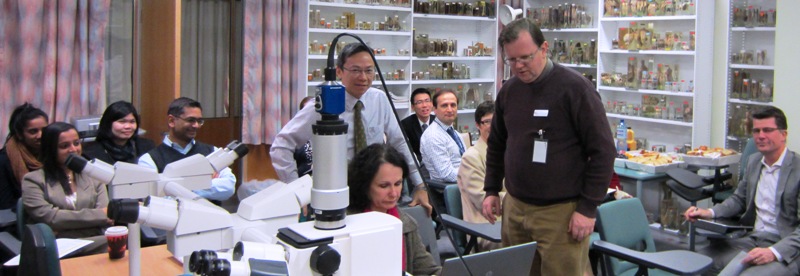MULTIDISCIPLINARY CARE The MDT Program offers many resources, professional staff and services that support patients and their families during their cancer journey - from the time patients are diagnosed through to the end of their treatment. Experts from the fields of oncology, physical therapy and support unite to offer each patient exceptional care, and advanced options for treatment. They are available to provide patients with information, education, practical and emotional support, nutritional therapy, rehabilitation, and pain and symptom management. Everyone plays an active and collaborative role in developing and implementing a treatment plan tailored to each individual. There are many different people patients will meet and work with at Sydney South West Cancer Services. Our Health Care Team consists of a number of dedicated, talented and compassionate cancer care professionals, who provide a variety of services. Each patient has different health needs, so will not necessarily work with all members of the team. Feel free to ask any of them for more information. Oncologists are doctors who specialise in cancer treatment. They work with patients and the rest of the health care team to determine the best treatment plan and monitor side effects.
Oncology Nurses are registered nurses who specialise in cancer care. You will meet a number of different nurses:
Radiation Therapists work with radiation oncologists to plan and deliver radiation treatments and monitor any side effects. Medical physicists work closely with radiation oncologists and therapists to plan treatments and ensure they are accurate. They also monitor and maintain the radiation treatment equipment known as linear accelerators. Social Workers provide patients and their families with counselling, support, education and practical assistance. The Social Work Service includes individual and group counselling for a broad range of issues including adjustment to cancer and treatment, relationships and family concerns, body image and sexuality. Social Workers can assist with self care and stress management techniques and providing information on talking to children about cancer. Social Workers also provide liaison and referral to community support services including legal, financial and housing services. Clinical Psychologists assist patients with their adjustment to their health condition, treatment, and changed circumstances at different stages of their illness. Clinical Psychologists work with you to develop strategies to manage your psychological or emotional distress, and many other common conditions such as depression, anxiety, sleep disturbance, and tackling difficult treatment procedures. Similarly Clinical Psychologists also provide assistance to the family members to enhance their coping and adjustment in relation to the patient's condition and in their role as the carer to the patient. Dietitians are available to help with your individual nutritional needs, as symptoms and treatment side effects can affect appetite or nutrition. They will assess your specific nutritional needs, and provide information and assistance to help obtain optimum nutrition, manage side effects and symptoms, and better tolerate treatments. Occupational therapists (OT’s) see people when their everyday function is affected by illness. OT’s assist client’s to maintain independence and function in their participation of daily tasks. OT’s aim to enhance a person’s quality of life by: maintaining independence where possible in day to day tasks; maximising function through the use of equipment and/or modifications; educating and empowering clients and their carers; educating clients and their carers on importance of home safety. Physiotherapists aim to maximise mobility, independence and function. They are involved in the assessment and treatment of respiratory problems, mobility and falls and in the prescription of walking aids. They design and provide exercise programs to increase joint range, muscle strength and exercise tolerance and reduce swelling and pain eg. Post-mastectomy shoulder management and post surgical review. Lymphoedema occurs when the lymphatic system does not function properly due to damage of the lymphatic vessels or nodes post surgery, or radiotherapy. Lymphoedema results in the long term swelling of one or more parts of the body. Lymphoedema management is a specialised area. Education, prevention and treatment can be given by either a trained occupational therapist or physiotherapist. Macarthur Cancer Therapy Centre Lymphoedema service is currently provided by occupational therapists and covers referrals from the Macarthur, Wollondilly and Bowral local government areas. Liverpool Cancer Therapy Centre Lymphoedema service is provided by occupational therapists and physiotherapists and covers referrals from the Liverpool, Fairfield and Bankstown local government areas. Speech Pathologists provide individual assessments and management intervention for swallowing and communication difficulties (e.g. issues with your speech and/or voice) related to your diagnosis or treatment. They provide ongoing education, intervention and support before, during and after treatment to optimize safe swallowing of food and drinks and to maximise your communication ability. Pharmacists prepare and dispense medications ordered by physicians. They are clinically trained to evaluate chemotherapy treatment, provide drug information and make recommendations on medication-related issues and side effects. Palliative Care and pain and symptom management physicians work with care teams to manage complex symptoms resulting from your illness or treatment (i.e., pain, nausea, lack of appetite, fatigue). Administrative and Support Staff offer support to the clinical team to ensure that the best possible care is provided, and your information is maintained in the best possible way. Volunteers help to make your visit as easy and comfortable for you as possible. All of our volunteers have been carefully screened and have attended training programs specific to their placement. |



